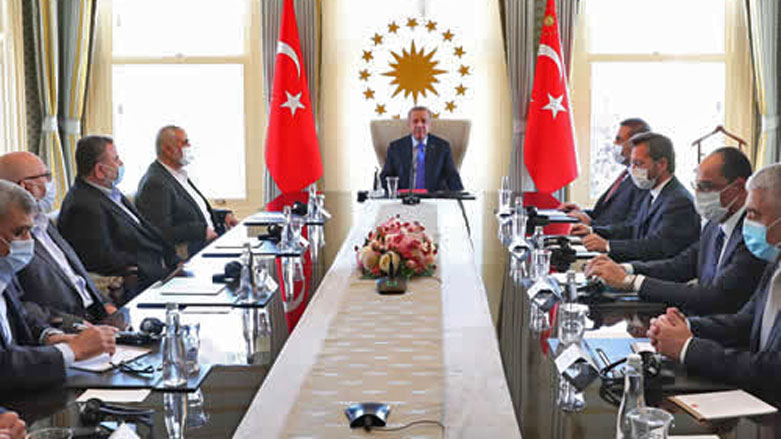US condemns Erdogan meeting with Hamas leaders

WASHINGTON DC (Kurdistan 24) – “The United States strongly objects to Turkish President Erdogan hosting two Hamas leaders in Istanbul on August 22,” State Department Spokesperson Morgan Ortagus said in an official statement issued on Tuesday.
“Hamas is designated as a terrorist organization by the US and [the European Union] and both officials hosted by President Erdogan are Specially Designated Global Terrorists (SDGT),” Ortagus continued.
On Saturday, Erdogan’s office issued a statement, saying that the Turkish president had “received the Head of Hamas Political Bureau, Ismail Haniyeh, and the delegation accompanying him.”
The statement noted that the Director of Turkey’s National Intelligence Organization, Hakan Fidan, also attended the meeting.
Ismail Haniyeh, Salih al-Aruri, and Nasser—Arab Standard Bearer
In January 2018, the US added Haniyeh to its SDGT list, in a statement that explained he had been born in 1962, some 14 years after the establishment of the state of Israel, in the Gaza strip’s Shati refugee camp. At the time, Gaza was under the control of Egypt, then led by Gamal Abdul Nasser, a military officer who was involved in the 1952 overthrow of Egypt’s monarchy, before becoming president of the country.
Salih al-Aruri, deputy head of Hamas’ political bureau, was designated a terrorist by the US in 2015, under the Obama administration.
Aruri was born in 1966, in Ramallah, in the West Bank—which was then under Jordanian control.
Nasser won a huge following among Arabs, in part, through his perpetual confrontation with Israel, and he became the standard-bearer of Arab nationalism.
In 1958, Nasser’s popularity led Syria to join Egypt in the formation of the United Arab Republic (UAR), and Nasser led the suppression of Syria’s Kurds in the name of Arab nationalism.
The UAR was a short-lived entity, as, in 1961, Syria broke free from what proved to be Egyptian domination. But Nasser soon led the Arabs into a bigger disaster. In 1967, they mobilized against Israel under Nasser’s leadership and then lost the Sinai, West Bank, Golan Heights, and Gaza in just six days.
The statement issued by Ortagus on Tuesday noted that the State Department’s Reward for Justice (RFJ) Program “is seeking information about one of the individuals”—i.e. Aruri—”for involvement in multiple terrorist attacks, hijackings, and kidnappings.”
Indeed, the RFJ Program announced in November 2018 that it would offer $5 million for information that would help bring to justice Aruri—who had been elected Hamas’ deputy head in October 2017.
The RFJ announcement explained that Aruri is “one of the founders of the Izzedine al-Qassam Brigades, Hamas’s military wing” and is “currently living freely in Lebanon,” where he is working with Qassim Soleimani. Soleimani headed the Quds Force of Iran’s Islamic Revolutionary Guard Corps (IRGC) until early this year, when the US assassinated him, as he flew into Iraq from Syria.
“Aruri funded and directed Hamas military operations in the West Bank,” the RFJ statement explained. In 2014, Aruri “announced Hamas’ responsibility for the June 12, 2014, terrorist attack that kidnapped and killed three Israeli teenagers in the West Bank, including dual US–Israeli citizen Naftali Fraenkel.”
Caution to Erdogan and his opposition to US peace plan
Ortagus statement included a warning to the Turkish president. “His continued outreach” to Hamas “only serves to isolate Turkey from the international community,” she said, and “harms the interests of the Palestinian people.”
Noting that this was the second time this year that Erdogan had hosted the Hamas’ leadership, Ortagus explained, “We continue to raise our concerns about the Turkish government’s relationship with Hamas at the highest levels.”
On February 1, Erdogan met with Haniyeh in Istanbul. Their meeting followed just days after the Trump administration unveiled its proposal for a peace plan between Israel and the Palestinians.
“Giving Jerusalem to Israel is absolutely unacceptable,” Erdogan said then, as he denounced the US plan. “It ignores Palestinians’ rights and is aimed at legitimizing Israel’s occupation.”
Ambassadors from the United Arab Emirates (UAE), Oman, and Bahrain attended the White House event in late January, when Trump, standing alongside Israeli Prime Minister Benjamin Netanyahu, announced the new US diplomatic effort.
Erdogan denounced those three states, as well as Saudi Arabia. “When we look at the stance of countries in the Muslim world toward this step and the announced text, I pity us,” Erdogan said.
“Saudi Arabia mostly, you are silent. When will you speak?,” Erdogan continued. “The same goes for Oman, Bahrain, the Abu Dhabi leadership.”
Erdogan’s meeting with the Hamas delegation on Saturday comes at another key moment in US efforts to advance its peace plan.
On August 13, it was announced that the UAE and Israel had reached an agreement to normalize relations. The US now seeks to expand the circle of Arab states involved.
Secretary of State Mike Pompeo is touring the Middle East. On Monday, he was in Israel, from where, on Tuesday, he flew to Sudan. He will go on to visit Bahrain and then the UAE. High on his agenda is advancing ties between Israel and the Arabs.
Meanwhile, on Tuesday, Netanyahu announced that a top-level US delegation, including White House senior adviser and Trump’s son-in-law Jared Kushner, along with National Security Adviser Robert O’Brien, would accompany an Israeli delegation to the UAE, led by Israel’s National Security Adviser Meir Ben-Shabbat.
The Turkish Foreign Ministry responded to the US criticism, saying that Ankara “fully rejects” it.
“Declaring the legitimate representative of Hamas, who came to power after winning democratic elections in Gaza and is an important reality of the region as a terrorist will not be of any contribution to efforts for peace and stability in the region,” Ankara stated on Tuesday.
Editing by John J. Catherine
